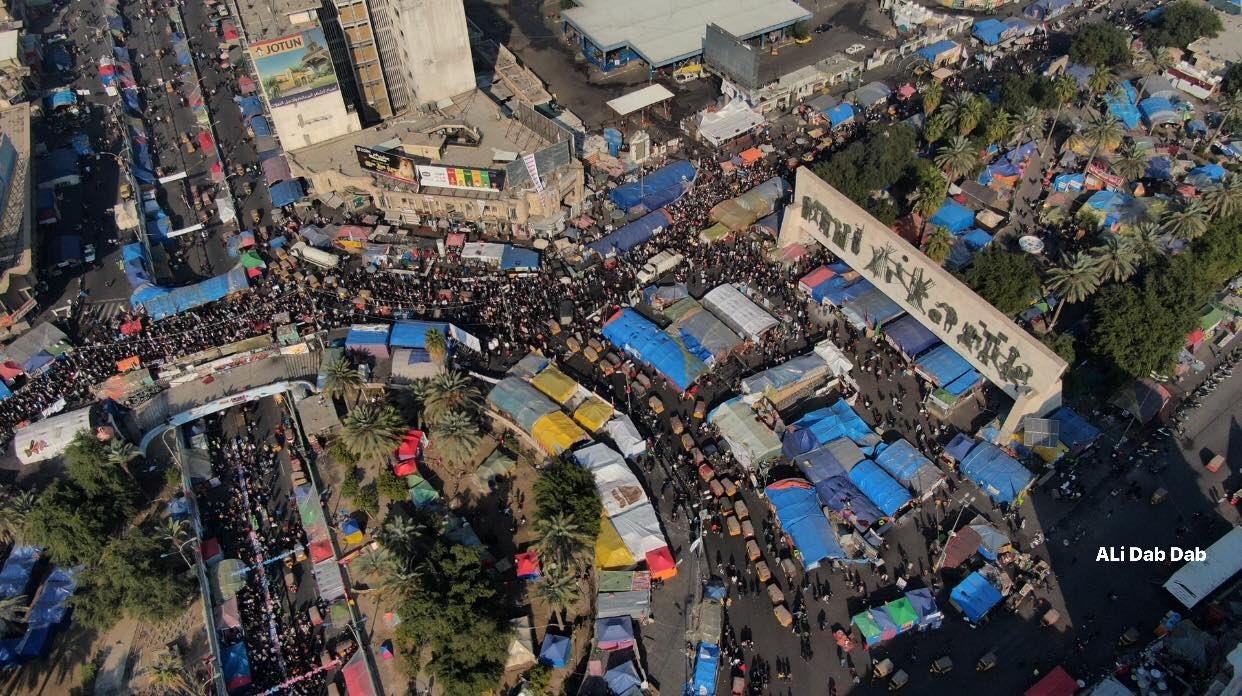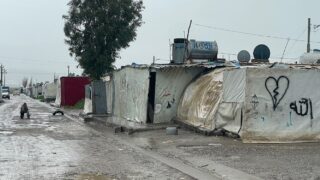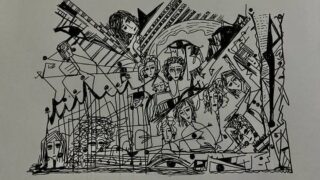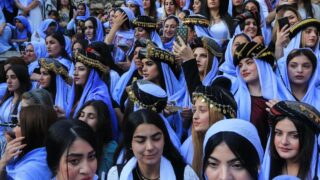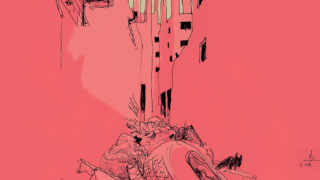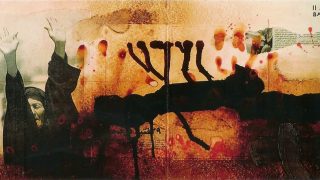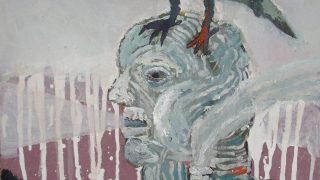
This publication has benefited from the support of the Rosa Luxemburg Foundation. This text may be reproduced in part or in full, provided the source is acknowledged.
The widespread and ongoing protests witnessed all throughout Iraq since October 1st of 2019, though differing in impact and numbers, has rocked many an established political and social notion, as well as the Iraqis’ understanding of their own country, their relationship with authority, politics, society, and family…
During and following those demonstrations, a new society and customs took shape, and a different generation came out, with a prolonged capacity to combat the ruling powers. A generation that has known but the regime installed following the occupation of Baghdad in April 2003, lived through the fragmentation of a collective national identity and a collapse of the value system, and saw Iraq’s cities live through their ugliest and most militarised phases. A generation that neither knows who administers violence in their country, nor takes on an active role in politics – for politics, as perceived by this generation, is monopolised by a group that lives in the Green Zone, fortressed within concrete walls and developed technological devices, oblivious to its society’s needs; a generation, then, that abhors parties… all political parties.
This generation, whose oldest were born in the late nineties, is also futureless. Born into a country sinking by the day into a mire of impoverishment, corruption, arms, and subordination policies, with phantom reform talks, and parties and forces expected to build lifeboats but swiftly swam away with the current, leaving the boat dismantled, splattered with Iraqi mud.
As such, the protests that took off in October 2019, whose momentum today’s Iraqis are trying restore, had planted hope in many, but dug new despair into the souls of others. Starting with the private, with family, and extending out to the general seems to me the better attempt to comprehend the events that took place during that year of hope, fear, and pensiveness. My youngest brother was born in Baghdad in 2001 – with our two generations gapped by a few differences. I therefore relied on a number of conversations with people from my brother’s generation and mine, from different classes, groups, and streams of thought, to understand how we now think.
During the first few days of protest (October 1st-5th, 2019), much blood was spilled onto the streets of Baghdad. Snipers took hold of tall buildings and military convoys closed off regional exits, whereas many were arrested under suspicion of being of a “protesting age”.
In stable societies, thirteen years would have been a customary and unremarkable age difference between one and his own brother, between my generation and his; they wouldn’t have made much of a difference. We would’ve perhaps even been considered as hailing from the same generation, that we share similar interests, concerns, and thought patterns. Iraq, different in turn in many ways, entrenches a large gap between two generations temporally separated by just over a decade. As such, the gap, along with the current state of affairs, seem to span many decades, rather than just over one.
Interest in Politics
Despite politics inhabiting a large space in our home –as in the rest of Iraqi households– and our daily conversations, and talks shows and newscasts dominating a wide space of our TV-watching agenda, little did I hear my younger brother talk or express his opinion on politics; he is oblivious about what happens in Iraq. The way we saw it –we who lived through Ba’athist Iraq, the Saddam Hussein wars, and the days of siege– he was just a teenager living in his own private world of which we knew nothing. We were sure, though, that one day he would enter the world of work, official institutions, and future-planning… and would then show interest in politics and make up his own mind about it; he would become a bright authority-resenting Iraqi.
This young man, however, dispelled our impressions. In September 2019, he and his peers rallied for the protests that would take off a little after October 1st of the that same year. Out of my parents’ five children, he and my sister remained in Baghdad. The three of us snuck away, one by one, equipped with different excuses, abroad.
Maps of Deprivation and Dissolution in Iraq
20-08-2015
I wrote to him, condescendingly and imperiously: “Stay home; joining those demonstrations will do nothing”. I acted from an expert position, an older brother, and a writer who knew those events, wrote about them and, most importantly, lived them. He responded: “I know, I won’t be participating”. But that didn’t last long. Neither I nor him knew that the October demonstrations would be unlike any protest Iraq had ever witnessed since the fall of Saddam Hussein. As soon as the protests took off, thousands of young people gathered in Tahrir Square in Baghdad, echoing countless concerns and questions. The desperate, the unemployed, the infuriated with families and clanships all joined them, as did anyone looking to carve out some space for themselves in this vast country, to cry out. Two ideas glued them all together: “rights” and a “homeland”. They therefore clasped onto two banners: “I’m standing up for my rights” and “a homeland is what we want”. They used them in songs, graffiti, and paintings, in posts and posters on social networks.
“Rights” manifested in demanding absent services, housing, electric power, paved roadways, education, and, mainly, the right to work. All those rights had been snatched in Iraq. Should any be available, they would be unevenly distributed unto populations with close ties to parties, whereby the latter would often use such rights to win the former over. In the meantime, the homeland looked like an image of the very shattered Iraq, left unassembled after the collapse of the previous regime, which ruled for a protracted period of time, for more than three decades…
Each of my young brother’s generation carries a homeland in their own imagination. An inclusive homeland, though. It believes in freedoms, respects rights, and treats everybody equally before the law. None of the guys had in mind any violent action. They held flags and signs when bullets and smoke grenades rained down on them. About a hundred people were killed and around four thousand were injured during the first five days alone, while no armed force in Iraq hesitated in suppressing those unarmed youth.
Violent Days
The demand for “rights” and a “homeland” terrified the ruling authorities. During the first few days of protest (October 1st-5th, 2019), much blood was spilled onto the streets of Baghdad. Snipers took hold of tall buildings and military convoys closed off regional exits, whereas many were arrested under suspicion of being of a “protesting age”. Baghdad became a city beyond the reach of this world and its media when internet was cut off and cell phone networks destabilised. My generation described those days as “the defeat”, and fear of further authoritarian raids crept into us all. Many had thought back then that the protests were over and done with!
For the first time, this generation terminated its dependence on the politician and Shia cleric Muqtada al-Sadr, and would rely on itself instead to mobilise. This generation shattered the myth the civil parties regurgitated, stating that no one but al-Sadr could organise a million people’s march.
A few days later, when a faint hint of the internet returned, videos uglier than we had imagined showed up: sniper headshots, summary executions in in Baghdad and Al-Diwaniya governorate, and lots of bullets; the security forces seemed to be fighting off an invading army. In parallel, pro-regime media and media with close ties to the regime began broadcasting conspiracy theories about “manipulated protests” and its young people’s backgrounds. It even pushed for an idea of the entire world’s country’s stirring those protests, trying to bring down the “democratic regime”. Unbelievable. The images of blood, of the murdered and injured, appearing all over social media were truer than a few sad newscasts broadcast through satellites no one but their funders watches.
Another Comeback
Spilt young blood had blood boiling in the heads of the other Iraqi generations. Quickly, October 25th was set as a date to take to the streets once more in around eleven governorates out of Iraq’s eighteen. The South and Centre, whose high positions and ministries are controlled by Shiite parties on their behalf, constituted the backbone of the protests. In the North and West, however, which comprise of Sunni cities that had just come out of a war on “Da’esh”, anyone instigating demonstrations would be arrested immediately. Whereas Kurds were already protesting, even if under different demands and banners.
For the first time, this generation terminated its dependence on the politician and Shia cleric Muqtada al-Sadr, and would rely on itself instead to mobilise. This generation shattered the myth the civil parties regurgitated, stating that no one but al-Sadr could organise a million people’s march. But this generation did it, without al-Sadr and his support. The latter even suffered a narcissistic wound, turning against the protesters more than once, with his followers violently attacking the streets and sowing fear throughout. Despite all that, no one was dragged into violence.
A New Manner of Organisation
Our generation’s readers used to depend on articles and books to figure out the potential ways and mechanisms of organising and protecting against regime brutality during protests. Eventually, however, readers and non-readers alike would rely on the “comrades from the communist party, or the Islamists who fought the Saddam regime”, when hitting the streets and taking over public squares. My brother’s generation, though, mobilised and lead those protests in an organised manner – not because they had been conscripted into the military or had any idea about military arrangements, but rather because they all had played the PUBG (PlayerUnknown’s Battlegrounds) game together! In this virtual game, many of them fought battles together with an aim to take over establishments, and had put together plans to overtake an imagined enemy.
The public sphere was thus used as a public space where everyone could meet, without, perhaps for the first time in the history of Iraq, any one group using violence to control another.
The most well-known example of such organisation might be that of the Turkish restaurant. In 2011, Nouri al-Maliki’s government took control over the Turkish restaurant in Tahrir Square, from which point it would operate against the protestors, an action repeated in both 2015 and 2018. In October 2019, however, the protestors turned the Turkish restaurant –a massive abandoned building that overlooks Tahrir Square and some part of Al-Karkh– into an impenetrable fortress, where hundreds gathered, whose main concern was to not lose it to the regime. Calls reverberated all throughout the first few months of protests to send food supplies, beverages, and blankets to the people holed up in the Turkish restaurant, for fear of any needs leading to the young people’s relinquishing control. That restaurant terrified the regime and its armed factions most, so much so that it left no satanizing piece of news unturned, propagating stories of the restaurant’s transformation into a hotbed of drugs and prostitution, all the way to accusations of systematic killings and human trafficking taking place therein.
Otherwise, teams were formed to countereffect the smoke grenades by transferring them from one team to another all the way to the tunnel, submerging them with water, and covering them with a thick blanket to deactivate them. The tuk-tuk (a three-wheeled vehicle) took upon itself more than one task, including transporting the wounded to the hospitals and clinics, manoeuvring in circles in front of the riot control vehicles and their hot-water hoses to divert them away from protesters. Kitchens and bakeries were set up in the backend of Tahrir Square to supply the sit-in tents with food. Worker unions, teacher unions, bar associations, and medical doctor unions joined the protests, some of which went on a strike, each of which taking on their own role to play.
In the South and Centre, the protesters closed down the parties’ headquarters, the petrol fields, ports, and border crossings in an attempt to shut down the economy. Voices were raised demanding that financial resources not be blocked, against which protestors retorted, “These are funds that come and go, and of which we see nothing”. Despite caution, and holding onto nonviolence to a large extent, tens were killed daily in both Baghdad and the other governorates.
Women, Spanning Two Generations
There was also a forceful presence of women in those protests; they were also forcefully killed, assassinated and injured.
In my generation, women’s position had undergone some change when compared with our parents’ generation. They joined the workforce, cars driven by women multiplied in crowded streets, and women could finally file for divorce if they were abused. Despite that, they had remained under men’s authority and control; even though women had fought to regain those rights, what they received was stamped with men’s approval, rather than in spite of their disapproval. Our generation’s journalism would keep writing about women as men’s “helpers” rather than independent actors in their own right.
Women and the Iraqi Revolution
09-03-2020
However, with the protesting generation of October 2019, Iraqi women seemed completely different. Women were on the frontlines of demonstrations in some of the most clannish regions, such as Dhi Qar, Basra, and al-Diwaniya, and they circled the protestors, separating them from the security forces to maintain their nonviolence, as had happened in Nasiriyah. Even women controlled by macho men, who had prevented them from going out to the protests, participated using whatever was in their means in supporting the demonstrations; poor housewives donated half of whatever little income they had in order to provide food and treatment to the protesters, whereas others used clan customs and traditions to turn their sheikhs against the authorities, while others stirred up their household men to join the marching streets.
The discussions that I had with the protesting youth showed that they were statists or supporters of statist values, whereas the ruling power was anti-statist, even against the State.
The women’s entire discourse was different here; they were no longer “supporters”, but rather actors, instigators, and participants. Such reality is what most terrified the political-Islam parties and clerics. It unfolded in an outburst of profanity against women that Iraqis had never heard before.
A Shifting Society
Even before the end of October 2019, news reverberated about politicians escaping the country. It was said that the Green Zone –with increased security fortifications that nothing short of an armed military could invade– were emptied of all officials barring those in power. Politicians who piled accusations upon protesters at the beginning, were now avoiding the media. In the meantime, sit-in tents started popping up in public squares in support of politicians and clerics backed up by external actors. The protesters, however, did not kick them out. They knew that the majority’s voice was loudest anyway and believed the squares belonged to everyone; no one should be trying to outdo the other. Any statement by those in the name of protestors was ridiculed and denied, muffled in the background.
The public sphere was thus used as a public space where everyone could meet, without, perhaps for the first time in the history of Iraq, any one group using violence to control another. All this is political, of course, but a political meeting of sorts has to contain more than just politics in its abstract sense. To slightly digress, society began taking shape away from the political elite and its rule, rather forming itself in opposition to it and its methods of governance. Society was thus reshaping itself, trying to find common denominators and propositions to live within a public sphere. Graffiti on the walls included progressive images, but also some with religious aspects. Protesters used the image of an unveiled girl browsing her cell phone one meter away from a cleric wearing a turban reading the Quran as exemplary of the homeland they all hoped for.
Baghdad became a city beyond the reach of this world and its media when internet was cut off and cell phone networks destabilised.
In no way did that mean that Iraqi society had rid itself of its daily predicaments, nor shook off the backwardness and violence for which it has been known in recent decades. However, all this showed its capacity to respect others without being spurred or pressured by elite rulers, whether political, religious, or tribal.
Fixed Politics
By the end of October 2019, Prime Minister ‘Aadel ‘Abdul-Mahdi resigned. Everyone was overjoyed, but the squares affirmed the continuity of protests. Demands began boiling down to holding the killers of protestors accountable; limiting availability of weapons to the State; holding accountable anyone involved in corruption files; the ratification of a new elections law; the formation of a provisional government that would run the provisional elections; and many other service-related demands. Security forces (uniformed forces and armed factions) attempted to disperse the sit-ins. Still, whenever one governorate faced security pressure, another would call for an escalation in its own streets, to take some of the brunt off the other. In this manner, Baghdad, Dhi Qar, and Basra took turns, each of which would be called the “Capital of the Revolution” every once in a while.
Throughout the lifespan of those protests, I would wonder how a furious raging generation, with a large number of its parents owning arms, could refrain from using the latter in spite of every attempt to drag them into an armed dual. I received many answers, all of which refused weapons; one guy even said: “Had we any respect for ourselves, we wouldn’t have even had three guns in our house”. He talked about everyone being under the rule of one law that guaranteed justice to anyone living in Iraq, “be they Iraqi, Bangladeshi, or of any other nationality… it doesn’t matter”, “What if many of us died – yes, we mourn them, those are souls with a past and a future – but we shall die anyway if we didn’t try, and we don’t want our attempts to turn into a civil war”.
Amidst spilled blood, protestors wouldn’t take less than a “revolution” to describe their movement and unrest. While it naturally is a revolution in many senses, it lacks much still. It was clear that the Iraqi elite was pitiable, with the streets distrusting them following the involvement of many in political offices. Should such momentum remain without an intellectual framework, however, upon which they could agree on demands and goals, the revolution would slowly be endangered. Still, that alone isn’t the reason behind its retreat. President Trump’s order to assassinate Iran’s General Qassem Soleimani and Iraq’s Deputy Chairman of the Popular Mobilisation Committee Abu Mahdi al-Muhandis had unleashed ferocious predators into the streets, exacerbating the confusion of the internal state of affairs. The two men’s supporters thus considered the protests to be backed by the United States. The two men’s supporters thus considered the protests to be backed by the United States and took as a proof of this allegiance the fact that some (very few) protestors had rejoiced at their killing. In all cases, it was an excuse to extinguish the protests; for ever since the start, protestors had chanted slogans condemning Iran, the States, and their backers, for destroying the country: “They demeaned you to ass-kissing… damned be Iran and America”.
Nature quickly delivered a new disaster to Iraq too. The Coronavirus arrived overnight, and fear from death by fever, coughing, and lack of oxygen in a country whose healthcare sector currently suffers a rarely matched collapse crept in.
Trump and “Corona” offered Iraqi politicians a chance to catch their breaths and return to their preferred disputes about sharing power and positions. The heads of factions agreed and disagreed on two candidates, who eventually never acquired the majority vote and dropped out; a third was brought in, former journalist and Director of Iraqi National Intelligence Services Mustafa Al-Kadhimi, as prime minister of a government in which everyone had their own piece of the pie. A government that heaped promises and considered itself the daughter of the October movement or, as al-Kadhimi termed it, the “October Events”, but has yet to fulfil any of the promises previously given to the protestors, which don’t seem likely to happen anyway. As for holding the protestors’ killers accountable, up until now, the government thought it enough to consider the murdered martyrs and to financially compensate their families. The corrupt, however, will not be held accountable; many of them are already featured in a myriad of governmental committees, while some of the murderers were appointed advisors to the president of the republic. And, finally, the elections law is stalled to a large extent for fear of the ruling parties losing their votes in the upcoming elections. Throughout all this, the frequency of assassinations carried out against activists is on the rise, forced disappearances became a new method of shutting up protests, while the wounded found no hospital to stitch their deep wounds. More than six hundred protestors were killed and twenty thousand wounded; no one knows the precise number of the abducted or assassinated ever since the protests began and until this moment.
Statists
My young brother’s generation understands that their success lies within their social revolution, ability to control the public sphere, and power to mobilise. They also understand that what they experienced was loss, and that the large quantity of blood spilled should not have been. On last year’s October 1st, my brother posted a picture of himself and a friend who was killed in the protests. He wrote: “A revolution takes place so that we can have a better life, not death”. The discussions that I had with the protesting youth showed that they were statists or supporters of statist values, whereas the ruling power was anti-statist, even against the State, because, for one simple example, it does not believe in the official organisms of security, and most -even senior clerics- own armed factions to defend themselves. Those armed factions were established not to avert external dangers, but rather to control society, essentially. In other words, the ruling authorities are aware of committing “mistakes” (which is the politest description of their actions I could find); therefore, the State, as a new establishment, cannot offer them any protection. As such, they are left fumbling for a number of various self-perpetuation methods, including persuading part of the population to back them, controlling public discourse (the media, public platforms, and social networks), and, finally, resorting to violence… abundantly and variedly, ever since October 1st, 2019.
The content of this publication is the sole responsibility of Assafir Al-Arabi and Rosa Luxemburg Foundation cannot accept any liability for it.
Translated from Arabic by Yasmine Haj
Published in Assafir Al-Arabi on 16/10/2020

